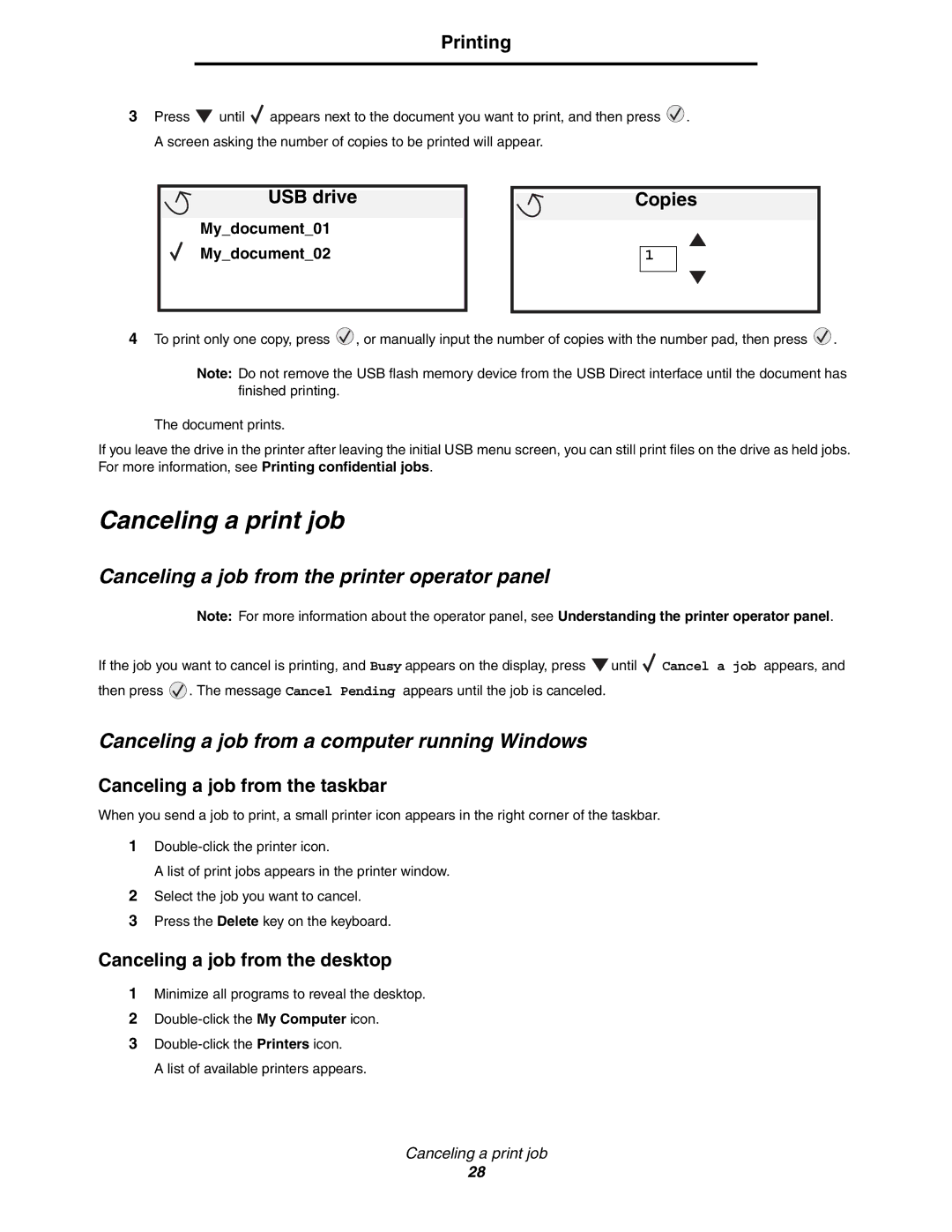C770, C772
Edition March
Safety information
Trademarks
Contents
Contents
Output options
Input options
Internal options
Installing and removing options
Installing a 2000-sheet drawer
Continue with Installing a 500-sheet drawer
Installing a 500-sheet drawer
Installing a duplex unit
Installing the printer
Installing an output expander
Installing an output expander
Installing a 5-bin mailbox
Installing a StapleSmart finisher
Removing the system board access cover
Installing memory and option cards
Installing a memory card
Installing a firmware card
Installing a hard disk
Installing an option card
Card Function
Connector
Accessing the printer system board
Removing memory and option cards
Removing memory cards
Removing an option card
Installing and removing options
Removing a hard disk
Removing a firmware card
Reinstalling the system board access cover
Printing
Understanding the printer operator panel
Printing
Operator panel buttons
Status Indicates
Sending a job to print
Button Function
Printing from a USB flash memory device
Canceling a job from the printer operator panel
Canceling a print job
Canceling a job from a computer running Windows
Printing a menu settings
Printing a network setup
Canceling a job from a Macintosh computer
Canceling a job from a Macintosh computer running Mac OS
Printing a directory list
Printing a font sample list
Loading the trays
Loading 500-sheet trays
Printing
Loading the 2000-sheet tray
Printing
Loading the multipurpose feeder
Printing
Printing on specialty media transparencies, labels, other
Windows
Mac OS
Loading the trays Loading the multipurpose feeder
Linking trays
Select File Print
Linking output bins
Holding a job in the printer
Printing and deleting held jobs
Value Description
Printing confidential jobs
Windows
Macintosh
Print Time Filters
Entering a personal identification number PIN
At the printer
Enter PIN
Verify Print
Reserve Print
Repeat Print
Copies & Pages or General pop-up menu, choose Job Routing
Print All Delete All JobName1 JobName2
Storing paper
Tips for successful printing
Storing supplies
Avoiding jams
Media guidelines
Paper characteristics
Paper
Media specifications
Storing paper
Media specifications Unacceptable paper
Selecting paper
Transparencies
Selecting preprinted forms and letterhead
Printing on letterhead
Media source or process Print side Top
Media specifications Selecting transparencies
Envelopes
Labels
Storing media
Identifying media sources and specifications
Card stock
Dimensions
Media sizes and support
Media support by type for optional features
Media types and weights input options
Maximum
Media types and weights output options
Maximum2,4
Media capacities
Paper labels
Vinyl labels
Banner paper
Determining the status of supplies
Ready. Tray 1 Low, Tray
Status / Supplies
View supplies Y K
Supply Menu selection item What the setting does
Conserving supplies
Ordering supplies Print cartridges
Maintaining the printer
Toner waste container
Fuser and ITU
Ordering a fuser
Type of fuser Printer voltage Part number
Ordering an image transfer unit and transfer roller
Recycling Lexmark products
Ordering staple cartridges
Clearing paper jams
Identifying jams
Access doors and trays
Clearing paper jams
Understanding jam messages
Paper jam messages
Message Check Areas What to do
Expander jams Area M
Area a
Clearing the entire paper path
Area B
Area C
Area D
Area E
Area T1
Area Tx
Area K
Area J
Area L
Clearing mailbox, finisher, or output expander jams Area M
Clearing fuser jams
Clearing fuser jams
Clearing image transfer unit jams
Clearing paper jams
Clearing paper jams
Clearing paper jams
Clearing paper jams
Clearing paper jams
If you still need help
Adjusting operator panel brightness and contrast
Disabling operator panel menus
Administrative support
Restoring factory default settings
Enabling operator panel menus
Adjusting Power Saver
Encrypting the disk
Setting security using the Embedded Web Server EWS
Setting the system password
Using the secure Embedded Web Server
Click Configuration
Click TCP/IP Port Access
Using Secure mode
Supporting IPSec Internet Protocol Security
Using 802.1x Authenticating
Click 802.1x Authentication
Click Menu Lockout Setup
Locking the operator panel menus
Black only mode
Confidential Print Setup
Click Confidential Print Setup
Printing Lockout
Aligning the image transfer unit
Size sensing
Using the Coverage Estimator
Disabling size sensing
Configuring printer alerts
Using the Setup Menu
Using MarkVision Professional
Using MarkVision Messenger
Online customer support Calling for service
Symptom Cause Solution
Checking an unresponsive printer
Check the Print as image box
Troubleshooting
Solving printing problems
Set Page Protect to Off from Print Recovery
For more informations, see Clearing mailbox, finisher, or
Solving mailbox problems
Output expander jams Area M
See Solving high capacity feeder problems
Solving option problems
Option Action
Solving high capacity feeder problems
Problem Solution
Solving paper feed problems
Solving print quality problems
See Loading the trays or Loading
Paper path
Marks occur repeatedly only in one color
Multiple times on a
Marks occur down the page repeatedly in all
Colors
To be replaced
Cartridges
BCD E
Solving color quality problems
Frequently asked questions FAQ about color printing
What is RGB color?
How does the printer know what color to print?
What is Manual Color Correction?
Is it possible to increase the gloss in the printed output?
What are Detailed Color Samples and how do I access them?
RGB
101
With a network cable installed
Electronic emission notices
Industry Canada compliance statement
Avis de conformité aux normes de l’industrie du Canada
Without a network cable installed
Korean MIC statement
104
Noise emission levels
German GS mark notice
Hinweis zum GS-Zeichen
Durchschnittlicher Schallpegel dBA in 1 m Umkrei
Power Saver
Mode Description Power consumption
Product energy consumption
Total energy usage
Laser advisory label
Laser notice
Statement of Limited Warranty
Lexmark International, Inc. Lexington, KY
109
Index
Index
PIN
112

